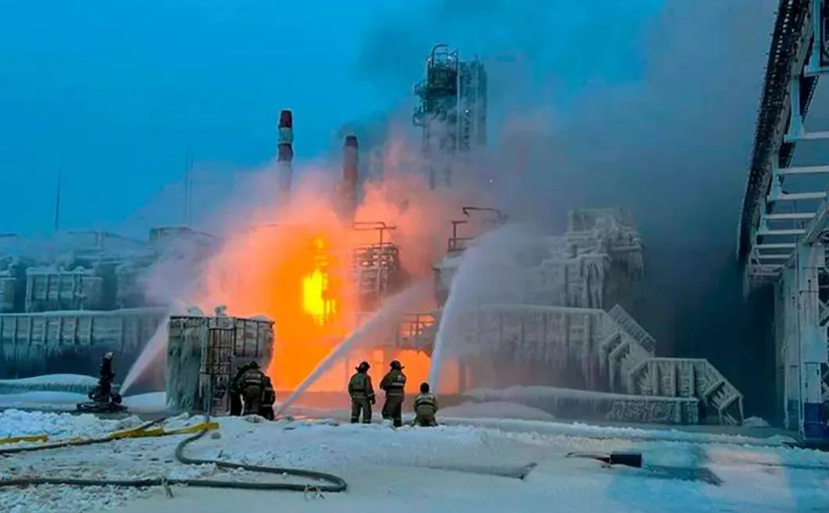According to Reuters on January 21, local officials said that a fire broke out in the port of Ustiluga, Russia’s commercial port on the Baltic Sea, in the early morning of the same day. Reports say the fire was caused by two explosions.
Massive explosion in Russian port
The fire broke out at a terminal owned by Novatek, Russia’s largest liquefied natural gas producer, in the port of Ustyluga. Novatek’s plant in the port is responsible for fractionation and transshipment of LNG, and uses the terminal to ship processed energy products to international markets.
The Leningrad Regional Administration said on Telegram that critical infrastructure in the surrounding area was on high alert and security forces and law enforcement agencies were ordered to destroy any detected drones.
He said that currently Novatek is carrying out the control of the fire and extinguishing work. “There were 148 people inside the facility at the time of the explosion, but there were no casualties and the situation is completely under control,” the district chief said.
Firefighters are trying to put out a fire in the port of Ustiluga
Russian news agencies reported that Novatek’s two storage tanks and a pumping station at the terminal were damaged in the blast, but the fire was under control.
Local residents said they heard a drone flying nearby before the fire, followed by several explosions.
Novatek said Monday that the explosion in the Baltic Sea port of Ustiluga was caused by “external factors.”
In response to the above explosion, the Ukrainian National Security Service said that in the early morning of the 21st, the Ukrainian national security department launched a special operation on a pier of Ustyluga port in Leningrad, Russia, using drones to attack the area, which triggered a fire and led to the evacuation of personnel.
Ukraine’s National Security Service said the operation was aimed at disrupting the Russian military’s fuel logistics.
It is understood that the port of Ustiluga is Russia’s largest port on the Baltic Sea, about 170 kilometers from St. Petersburg and 35 kilometers from the Estonian border. The port has 12 terminals and is mainly used to handle the export of oil, fertilizer, liquefied natural gas and materials such as timber and grain.
9 million barrels of oil in danger
In addition, the international crude oil market is also facing a huge transportation crisis. After intensive British and American air strikes on Houthi anti-ship missile bases, the Houthis said that they would retaliate against British and American commercial vessels.
A number of shipowners, brokers and traders rushed to say that tanker charters carrying crude and fuel oil showed that more ships were avoiding the dangerous waters.
According to ING, about 80 percent of container ships on the Red Sea-Suez Canal route were forced to divert after mid-December 2023, reaching 90 percent by early January this year.
Nearly 9m barrels of oil from Saudi Arabia and Iraq could face delays due to the emergency diversion of tankers around the Horn of Good Hope, according to industry figures.
Of those, at least two vessels carrying a total of nearly 3 million barrels of Saudi crude oil and refined products are likely to be delayed after loading in the Persian Gulf this month. Five other tankers carrying up to 6 million barrels of Iraqi crude are also being diverted from the Red Sea.
The ships, which were carrying crude oil and refined products from the Saudi ports of Ras Tanura and Jubail and Iraq’s Basra port this month, have urgently rerouted out of the Bab el-Mandel Strait at the southern entrance to the Red Sea, with most of them rerouted on or after January 12, ship-tracking data showed.
It is worth noting that the Middle East region accounts for about one-third of the world’s total crude oil production. Middle Eastern crude has become increasingly important to Europe after it largely cut off Russian energy imports.
According to CCTV Finance, data show that the Middle East crude oil shipped to Europe is constantly decreasing. Exports in December 2023 were about 570,000 b/d, almost halving from 1.07 million b/d in October 2023, which will have an impact on European energy supplies.
Market participants say there are already large cargoes of Iraqi crude being booked to go from the Persian Gulf to Europe, bypassing the Cape of Good Hope in Africa.
In terms of freight rates, different types of tankers have been climbing in recent weeks.
Rates for Afra tankers, which can carry 700,000 barrels of crude, have more than doubled since mid-December 2023 to nearly $80,000 a day; Rates for Suez-type tankers, the largest type of ship that can carry 1m barrels of crude through the Suez Canal, have risen by about 50 per cent to nearly $70,000 a day.
“What looked like a matter of weeks can now be a matter of months.” Alexander Saverys, CEO of Euronav NV.
Separately, global shipping giant Maersk warned in a memo to customers that global shipping networks could fall apart due to elevated risks in the Red Sea.
Source: Shipping Information, foreign shipping
Post time: Jan-24-2024


